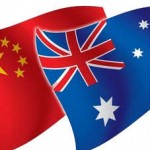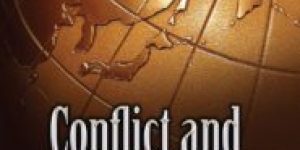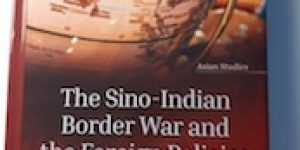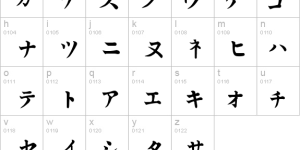My Story ~ 24. The Older I Get, The More I Enjoy My Life
No comments yet “Draw wisdom from the spring of life and you can taste its sweetness.”
“Draw wisdom from the spring of life and you can taste its sweetness.”
I was born in 1957; however, at the age of 40, I split my life in two different hemispheres – China, the northern and Australia, the southern. At my age, I can treat these two different countries in a mature way and not discard either of them. Normally, people at this age are reluctant to leave home for a foreign land, but I did, and after growing older I began to consider the whole world as my home, and the older I get, the more I want to travel. Yes, though old, I am never satisfied. I want new and different experiences.
I was born in a small village in Linjiang, Zhejiang, a place where all villagers possess the same surname. This is quite unique in China which only shows that in the long peaceful life here, from one generation to the next we never left our village. There’s clearly a bond between this piece of land and me, my ancestors, our blood. My name was actually given to me by a female Commission Secretary, it means hardworking and simple, expressing both the reality of material shortage in 1957 and the great ideal of “thrifty for the country and home”. Then I began my schooling days relying on the spirits of endeavor which was quite unique at that time, and I left my village for a big city. What followed was graduation, working, marriage and having children, all stages of life that Chinese people did in those years, unhurried and in an orderly fashion.
I lived in Hangzhou which is one of the ancient capital cities and boasts beautiful scenery and also beautiful legends including the love story of Whitesnake. Also located in the downtown area is a famous lake – West Lake which has stimulated thousands of poems and tears. My wife and I worked in a university at that time and we would go to West Lake in our spare time. Compared with cities of today, Hangzhou at that time was a small city with a population of only several million. Not much industry, no excessive construction, this small city was actually quite clean and beautiful. I still remember that I would ride a bike, with our little daughter in the front and my wife in the back seat, to the Lake during holidays. There would be lots of tourists in fine weather, all contributing to a lively, free and comfortable atmosphere. Yes, this is the main leisure activity in Hangzhou. During those days, I had no idea of what my life would become.
My wife was transferred to Australia in 1995. It was at that time that the idea of immigration came into her mind and she also encouraged me to consider doing the same. However, I rejected the idea. What I was thinking was that I was nearly forty years old and it was really a major decision to fit into a new environment. Actually, the biggest difficulty would be the language. You can’t imagine what it is like to live and communicate with others if you don’t know English. Besides, I lived pretty well in Hangzhou. Going to Australia meant I had to abandon all that I had accumulated after years’ of effort and start all over again, like a young man, which would be a big challenge for me. So what I planned then was to wait for several years after I had retired.
However, I finally came in 1997 when I was forty years old. It seems like a law that something which is hard to decide after much hesitation and second thoughts will always be solved because of a small accident, which pushes you onto a brand-new like track easily and gently. What I was not comfortable about was my daughter’s schooling. Date of birth usually decides a child’s schooling date – start now or wait for another whole year. That is to say, if your birthday is before this fixed date, you are admitted to school with other children of the same age, while if you are born later, even if only a few days, you have to wait for another whole year. Unfortunately, my daughter belonged to the latter group and this was beyond my control. She was quite clever actually which added to my annoyance of her being held back a year. As a result, I finally made up my mind to come to Perth. My wife helped me and we enjoyed a family re-union in Perth.
According to Confucius, a person at the age of thirty should have established his family and at the age of forty should know his destiny. Well, when I was thirty, I thought I had basically settled down. However, I entered a whole new life of uncertainty at the age of forty! I remember there were numerous people on the street, at my workplace, and the roads and parks were always full of tourists during holidays. It was hard to find a quiet, peaceful place but, here in Perth, I finally discovered what peace was like, but this peace was too horrible to enjoy. Day or night, there were few people on the street expect in the shopping malls. I couldn’t fit into this quietness and I even began to miss the noisy market back in Hangzhou. Well, later I know, people like us who have lived in the same village for over three generation will visit our neighbors and establish strong bonds, similar values and recognition through communication. Though having left the village a year ago, the city was never too big to feel separate from each other and occasional quietness was unable to break the habit of being in a noisy place. We couldn’t put up with living alone, away from others.
The biggest problem was how to start life here. With my wife still studying, I had to shoulder the responsibility of raising our family. So I had to work. Well, what I could do became another serious headache because I knew no English. A friend of mine was going to Singapore at that time, so he recommended that I take over his job and peel onions with some Malaysians in a factory. With Chinese around and easy work, I gradually gave up what I had learned and done in China. At the age of forty, peeling onions was the beginning of a new life in Australia. This was a low-paid job – 11.5 dollar per hour with 8 hours a day, but I would usually have my work done within 5 hours. So after three months, the boss appointed me as a leader and I worked in that position for another one and a half years.
While it’s hard to imagine a leader with no knowledge of English, it was actually quite easy work – to finish your order was all you had to do. My wife had to study, our daughter had to go to school at that time, I would send her at 8:45 and pick her up at 14:45. I also had to take time to cook lunch for my wife in case she was late. So on the one hand, I had to work, while on the other hand, I had to complete this seemingly routine house work which was hard to believe. Forced by circumstance, I succeeded in finishing my work and also play the role of a house husband. I also cared for our second daughter; I often took her to work. Yes, a person’s potential is often great which is formed by force and after becoming accustomed to change, nothing is impossible. Actually you have no time to think about it. This job ended when the factory was sold and although I found another job and worked there for three weeks, I finally quit because of the long working hours and low payment.
Once I got the opportunity of a decent job from a Taiwan boss who wanted to appoint me as factory manager, this meant that, my management experience gained in China could be used. However, the aluminum ingot manufacturing plant finally failed because of his poor management. This should have been a good work opportunity, but it ended badly.
Working and living in Australia is actually more about observation and experience. The most interesting experience I have met is a story about a policeman and a thief. It was when I was working in the factory and I came across a thief. I called the police but they didn’t arrest him when they arrived but informed him that they had arrived outside of the factory. After hearing the police, the thief sneaked away. Well, I got the impression that there’s an understanding between police and thieves: police are not after the thief but just want to stop a crime. The thief’s slipping away doesn’t matter. Once the police released a thief who had been caught by us, they told us that the thief was under 18 and should be released. Obviously, police are too merciful to criminals including thieves.
I have always been thinking of an example to express the hospitality of Australians. What impresses me most after I came here is that Australians usually offer to help others expecting nothing in return; they trust each other, no distrust exists between them. Even strangers in the street will smile to each other. If encountering an unhappy situation, they will be patient and polite even if they are not so comfortable. For example, if we stain their floor, they will tell you that it’s unfortunate but will not criticize or blame you. Australians don’t like to be in conflict or argument.
What Australia changed me most in me was the sense and acknowledgment of equality. While in China, the different levels of occupation, no matter in a factory, company or in society, not only represents different responsibilities, but also defines one’s identity, social status and even power. Obviously, managers possess power and advanced identity and status, different to workers. Working in the service industry is considered to be a low level job and the workers can be treated badly in restaurants. In Australia, the concept of equality is a core value. You are just a person and on this basis, different jobs simply mean different responsibilities. So differences in wealth, occupation and status constitute no inequality or discrimination. The simplest and most obvious manifestation is that I’m wearing more and more casual clothes, just like other Australians.
This equality and respect for each other releases the tensions and pressures found in society. Poor or wealthy, people can live a happy life and just be themselves. Of course there is a precondition – life in Australia is not that difficult; you can be an ordinary person, but as long as you are hardworking, you will always be paid. Such a life will overcome vanity and pressure. I’m getting more and more used to helping other people if I’m free. These are the changes that I personally felt after living in Australia.
Maybe you think I have totally adapted to life here, well, no, probably because of my age, I just can’t abandon my previous life and neither can I get on with life here easily, so my English is still poor after living here for nearly twenty years. That seems to be the final defensive line that I use to resist changing completely. I still possess a Chinese passport, I still have my Chinese nationality. Chinese or Australian – if it is a choice between the two, I will always choose the first. I often go back to China to get together with friends and relatives. Though separated from each other, there is no distance between us both in time and in space. We are close to each other just like before. My wife even complains to me that although I’m living with her, I’m closer to my brothers and sisters back in China and my heart always stays there. I think this has probably originated from the tradition of my hometown – you have to rely on your brothers and sisters when getting old. Maybe the first forty years of life has taken a deep root and just can’t be given up so easily. Or maybe although Australia has changed me and I agree with everything here, I just cannot fit in. As for the real reason, I haven’t figured it out yet.
But am I still a complete Chinese? Actually no. After all, my wife and two daughters are Australians and the closest people to me in the latter half of my life have taken root here. Especially my daughters, who eat Australian foods, speak English and both have grown taller than me, have identified themselves as Australians. Though they can speak good Chinese and will have to go back to Hangzhou for college, they are closer to Australia deep in their hearts. Of course, maybe it’s just me thinking too much like other sixty years old, that young people don’t care so much about being Australian or Chinese and the world is actually not so big in this internet age.
As for me, I can’t abandon my identity and status and this extreme change just urges me to think more. And this change actually began when I was still in China. Born in a poor village during hard times, and then shifting to a rich city before I had time to reflect, I was pushed to the other side of the ocean, hearing a different language and communicating with different people with another skin color. What does it mean to me when I am faced with more changes than others of the same age? I thought I would have no time to think and would probably never find the answer, while actually there’s an adjustment and choice made in my mind. For the current me, both China and Australia are my home, neither of which I prefer. At the age of sixty, I don’t feel confused and have no time to be confused. After my father passed away and friends in China left me one by one, death actually taught me an attitude to life: wherever you stay is your hometown, so cherish and enjoy what you have.
Am I old? Sixty is definitely old in traditional China, but living in Australia inspires me to pursue a healthier life, diet and exercise. I have fully realized the importance of good health. The older you get, the more you want and the happier you should live. We should travel and it was leaving China that made me realize how big our world is. It is not like the small map or the shallow life on TV. The real life is deep, with real sense and feeling and also has surprises awaiting us. So I will travel around with my wife to China and other countries, to deserts, high mountains, temples and parks.
Look, the life divided between China and Australia has never overwhelmed me, I discovered a bigger, wider world. Draw wisdom from the spring of life and you can taste its sweetness.
You May Also Like
Comments
Leave a Reply









